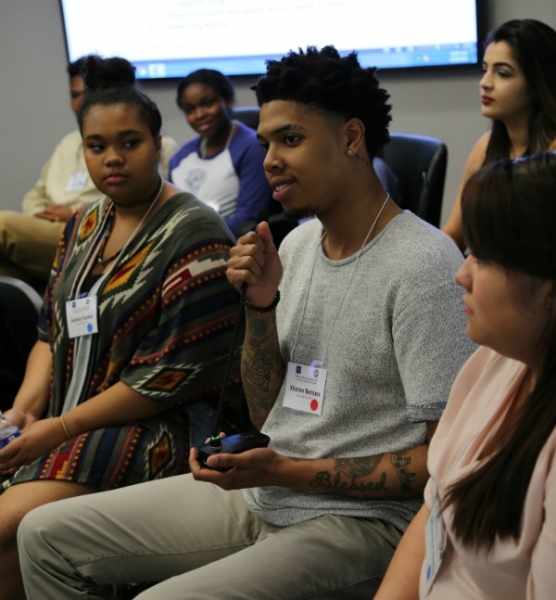Youth who receive special education services under the Individuals with Disabilities Education Act (IDEA 2004) and especially young adults of transition age, should be involved in planning for life after high school as early as possible and no later than age 16. Transition services should stem from the individual youth’s needs and strengths, ensuring that planning takes into account his or her interests, preferences, and desires for the future.
Listening Session Summary: Overview
 In June 2016, the federal government hosted a listening session with youth from across the country who have or have had an incarcerated parent. The listening session brought together 19 youth, ages 15 to 23, with a diverse range of experiences to discuss the challenges they had during their parent's incarceration and their ideas for how federal programs could better empower them and their families.
In June 2016, the federal government hosted a listening session with youth from across the country who have or have had an incarcerated parent. The listening session brought together 19 youth, ages 15 to 23, with a diverse range of experiences to discuss the challenges they had during their parent's incarceration and their ideas for how federal programs could better empower them and their families.
This summary is divided into four sections and can be viewed on this website via the links below and downloaded as a PDF (22 pages):
- Introduction
- Preparation and Process
- Session Themes: What Youth with Incarcerated Parents Want You to Know about Them
- Session Themes: Youth Ideas for Change
Additionally, Appendix A: Infographic of Participant Demographics can be downloaded as a separate PDF (6 pages) or GIF image (17.3 KB).
Research links early leadership with increased self-efficacy and suggests that leadership can help youth to develop decision making and interpersonal skills that support successes in the workforce and adulthood. In addition, young leaders tend to be more involved in their communities, and have lower dropout rates than their peers. Youth leaders also show considerable benefits for their communities, providing valuable insight into the needs and interests of young people
Statistics reflecting the number of youth suffering from mental health, substance abuse, and co-occurring disorders highlight the necessity for schools, families, support staff, and communities to work together to develop targeted, coordinated, and comprehensive transition plans for young people with a history of mental health needs and/or substance abuse.
Nearly 30,000 youth aged out of foster care in Fiscal Year 2009, which represents nine percent of the young people involved in the foster care system that year. This transition can be challenging for youth, especially youth who have grown up in the child welfare system.
Research has demonstrated that as many as one in five children/youth have a diagnosable mental health disorder. Read about how coordination between public service agencies can improve treatment for these youth.
Civic engagement has the potential to empower young adults, increase their self-determination, and give them the skills and self-confidence they need to enter the workforce. Read about one youth’s experience in AmeriCorps National Civilian Community Corps (NCCC).










